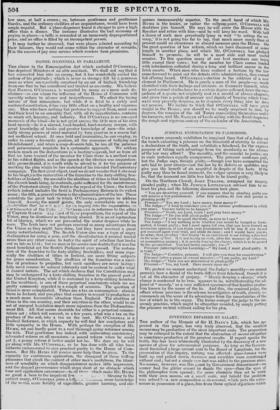JUDICIAL EXHORTATION TO FALSEHOOD.
CAN a more unseemly exhibition be imagined than that of a Judge on the bench exhorting a prisoner on the threshold of eternity to retract a declaration of the truth, and substitute a falsehood, for the express purpose of taking such advantage from the mendacity as the chance of the law may alibrd ? The morality, and the scandal to justice, are in such instances equally conspicuous. The prisoner confesses guilt, but the Judge says, though guilty,—though you have committed the acts laid to your charge—yet the law by its defects or quibbles may give you the benefit of an acquittal in despite of the facts. If the .guilty may thus be found innocent, the vulgar opinion is very likely to be, that the innocent are little less liable to be found guilty.
On the Northern Circuit, JOHN PILLING, arraigned for forgery, pleaded guilty ; when Mr. JUSTICE LITTLEDALE advised him to retract his plea, and the .following discussion took place.
"You are deceiving yourself, if you suppose that by pleading guilty you will receive a less punishment. After this caution, do you still persist in :pleading guilty ?" Prisoner—" Yes, my Lord ;. have mercy, have mercy I" The judge—" I wish ta ccinvince you of the serious predicament in which you stand. You are liable to be hanged." Prisoner—" Truth, my Lord, truth ! and pray have mercy !" The Judge—" Do you still plead guilty ?" Prisoner—" I wish to speak the truth, as near as I can."
The Judge—" I say nothing as to whether you would be hanged or transported, if found guilty ; but I must again tell you, that you have formed an
erroneous opinion, if you think your punishment will be less if you do not put yourself upon your trial, and abide its issue ; and I would have you remember, that pleadingNot Guilty' to an indictment is not telling a falsehood in the name of God. It is not taking an oath, after the manner of witnesses, or committing Perjury; it is merely denying the charge, which is to be proved by the prosecution. You had better consider ; for—"
Prisoner (interrupting his Lordship)—" My Lord, I must plead guilty. It is truth."
The Judge—" Consider, prisoner. I will give you time for consideration." Prisoner (after a pause of several minutes)—" I am guilty, my Lord." The Judge—" Then you are determined to plead guilty ?" Prisoner—" Yes, my Lord. Have mercy upon me !"
We protest we cannot understand the Judge's morality—we cannot perceive how a denial of the truth differs from falsehood, though it is riot of the character of perjury. "Merely denying a charge," which charge is confessed to be true, appears to us, notwithstanding the adjunct of " merely," as a very sufficient specimen of that familiar production known by the name of the lie. And this, the ermined judge, the officer whose province is the solemn investigation of truth, gravely recommends on the score of its advantages from the uncertainties of the law of which he is the organ. The forms compel the judge to the unseemly practice, which might be altogether avoided, by simply putting the prisoner on trial without calling for his plea.


















 Previous page
Previous page